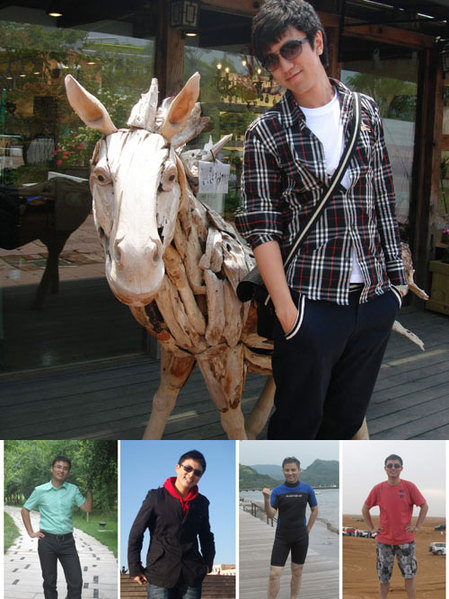Metrosexuals strut their stuff
Updated: 2011-11-17 07:57
By Liu Wei (China Daily)
|
|||||||||
|
 Cheng Gong (top) and Ge Candong (above) are among China's increasingly stylish young men. Photos provided to China Daily |
China's young, middle-class males are not peacocks but neither are they afraid of investing in their appearances. Liu Wei from China Features reports.
At college, Ge Candong's classmates mocked him for being unfashionable.
Since then, the 28-year-old Ge has transformed into a "metrosexual", a straight urban man who is sensitive, caring and not embarrassed about enjoying a stylish life. He takes care to coordinate his outfits and follows a rigorous skincare regimen.
"Dressing well and using makeup is good for me and I'm happy to be a handsome gentleman," he says.
He was plagued by dark circles around his eyes at college - caused by fatigue - and it was at this time that he began to worry about his so-called "face issues".
A female friend suggested he try eye cream, which dissipated the rings around his eyes. Since then, he has spent a lot of his free time flipping through fashion magazines and browsing websites focused on male beauty.
He often buys clothes and skincare products on business trips abroad.
While his colleagues wanted to go sightseeing on a trip to Los Angeles in 2010, Ge instead went shopping and spent $2,000 on skincare products. He spent another $1,575 on ties and suits in Hong Kong just two months later. He maxed out two credits card in Dubai in May.
"A product designed to minimize the pores and control grease without feeling tight was perfect for me, so I bought it without hesitation - even though it cost me an arm and a leg," he says.
Cheng Gong is another of China's increasingly stylish young men. The former Esquire (China) employee says he had little fashion sense until he enrolled at the Central Academy of Drama (CAD).
Cheng says he prefers a confident and "appropriate" look rather than high fashion. He believes men should be masculine and dress according to the occasion.
Surface China's art director Xiao Yaohui agrees and says, "A woman should dress like a woman, and a man like a man" - even though "the mainland has entered the so-called 'gender-neutral era' in which men and women are interdependent and treated more equally".
Xiao says this gives women the opportunity to forsake their masks of fragility and for men to reveal their emotional side.
"Two decades ago, no man would dare walk down the street in pink, but now one in every 10 men has a pink shirt or coat in his wardrobe," he says, adding that men no longer seem shy about being in touch with their feminine side.
According to a report released by L'Oreal, 2011 saw a 40 percent jump in the men's skincare market in China - five times that of the women's skincare market.
L'Oreal pulled in at least 1 billion yuan ($157.49 million) from its men's skincare products in China in 2010, according to the China Cosmetics Association.
Sun Zhongxin, a gender studies expert, believes the emergence of metrosexuals in China is the result of an advancing consumer culture and further demonstrates the country's middle-class demographic is the least secure and most worried about life.
They are not wealthy enough to afford luxuries on a daily basis, he says, but are not so cash-strapped they can't spend on items that improve their appearances.
In addition to spending on clothes and cosmetics, metrosexual men are increasingly visiting spas. Extraordinary Space, a men's beauty chain in Beijing, was established 11 years ago and has three branches in the capital, in addition to outlets elsewhere.
A Beijing-based white-collar worker, who didn't want to give his name, has been a regular men's beauty shop client since 2001 and admits he spends up to 50 percent of his wages here.
"But this investment makes me look like 20-something rather than a 30-something."
The middle-class generation born after 1980 also appears to be moving away from traditional high-end luxury brands toward more affordable brands like Coach.
In the coming decades, China's metrosexuals are expected to become more confident about their appearances and demanding about products that help them stay ahead of the game.











